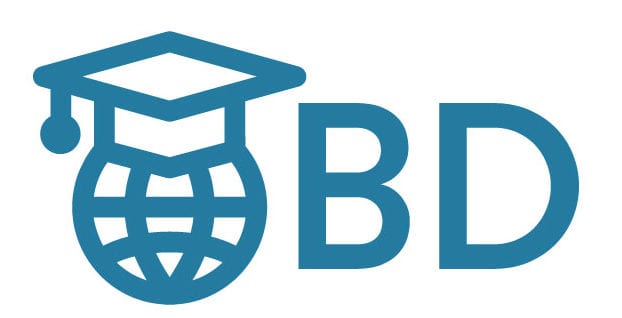Are you someone who is fascinated by the way human beings socialize and interact with one another? Do you have a passion for studying different cultural, ecological, political, and religious beliefs that influence societies? If yes, a degree in sociology might be the most suitable program for you.
Sociology is a vast field of study and is combined with different areas of discipline, such as psychology, linguistics, political science, humanities, philosophy, and anthropology, among others. As such, it will prepare graduates with a wide range of career opportunities.
Moreover, sociology is the field of study that explores how structures and systems govern how we interact within societies, with communities, and with other people. A Bachelor of Sociology degree provides a comprehensive understanding of social structures and their dynamics.
It examines the causes and consequences of social change and social issues while equipping students with the research and analytical skills they need to study and improve social conditions.
As a sociology student, you’ll learn about the evolution and history of civilizations, how revolutions and social conflict alter interaction, and the impact of economic inequality, armed conflict, and criminal eccentricity.
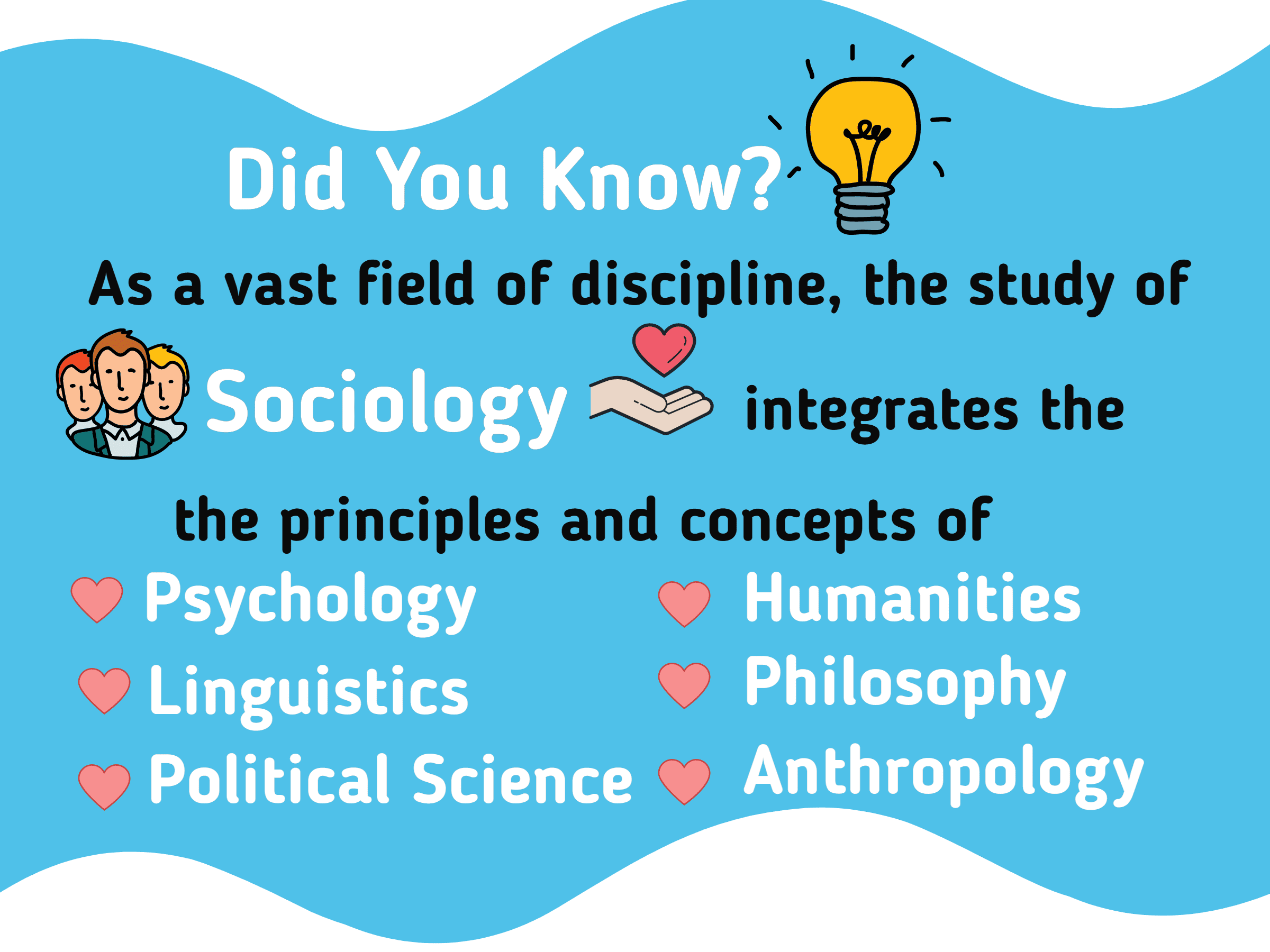
Despite studying social behavior and human interactions as the core component of sociology, students can now pursue a degree in sociology without leaving the comforts of their own homes. Similar to earning a psychology degree, a Bachelor of Science (B.S.) or Bachelor of Arts (B.A.) in sociology is a versatile field, equipping students with the essential skills and knowledge to pursue professional endeavors in crime and law, education, medicine, and health, non-profit organizations and many other industries.
Like most degree programs, both online and traditional learning formats, students in an online sociology degree program must complete a capstone project or a seminar and an internship program. For those who already have careers in the sociology field, some online academic institutions allow the transfer of credits for past work experience.
Page Jumps!
- Best Online Schools for Bachelor’s in Sociology
- University of Florida
- CUNY School of Professional Studies
- California State University-Fullerton
- American Public University
- Florida International University
- Tennessee State University
- Arizona State University
- Columbia College
- UMass Global
- University of Texas Permian Basin
- Oregon State University
- Frequently Asked Questions
METHODOLOGY
Our profiled list of the Best Online Schools for a Bachelor’s in Sociology showcases the online academic institutions in the United States that, in more ways than one, are superior to the rest. We have set benchmarks for selecting these top-flight online schools.
- The online schools on this list aim to produce competent graduates and therefore maintain stringent requirements for admission, retention, and graduation.
- In terms of Sociology degree program features and core courses, these online schools offer rigorous coursework and extensive curricula. As a result, online students emerge as competent social work professionals.
- These online schools also hold stringent requirements for student entry, retention, and graduation, ensuring students are ready for a professional journey.
- When available, information about the virtual learning platforms is also disclosed. The online Sociology programs also feature experienced specialists in the field.
- Other pertinent data, such as tuition rates and student aid options, are also mentioned on this list.
To learn more about our ranking process, please see our Methodology page.
Best Online Schools for Bachelor’s in Sociology

University of Colorado Denver

Online Bachelor of Arts in Sociology
The University of Colorado Denver has a Bachelor of Arts in Sociology which is a highly regarded and accredited program taught by world-class faculty with the same quality as the on-campus learning format. Students explore:
- social problems,
- research methods,
- race, ethnicity & gender,
- social systems,
- social institutions, and many other sociology-related topics.
CU Denver’s sociology program offers relevant and extensive coursework that fulfills every step, preparing students for a variety of careers in the sociology field. It can be earned at the same pace as the traditional undergraduate bachelor’s degree or depending on the student’s pace.
Also, the sociology program offered by CU Denver has three optional certificates for students to enroll as desired, namely Families & Social Welfare, Criminology, and Sociology of Health & Medicine.
The University of Colorado Denver has received accreditation from the Higher Learning Commission.
University of Florida

Online Bachelor of Arts in Sociology
The University of Florida offers an online Bachelor of Arts in Sociology that provides students with liberal arts learning that emphasizes the different social causes and consequences of human behavior.
The university offers a comprehensive approach to teaching the sociology curriculum that will provide the ability to integrate research that informs the public policies and methodologies that propel communities for the better.
UF’s Sociology undergraduate program includes coursework in:
- urban sociology,
- sociological methods and theories,
- poverty and inequality issues,
- environmental and resource education,
- social psychology,
- and ethnicity and minority studies.
The program prepares students to become competent in criminal justice, marketing, business, community, and social service, public health, and human resources careers.
The University of Florida receives accreditation from the Southern Association of Colleges and Schools Commission on Colleges.
CUNY School of Professional Studies

Online Bachelor of Arts in Sociology
Based in New York City, CUNY School of Professional Studies has an online Bachelor of Arts in Sociology that is considered one of the most affordable online educational institutions to offer a degree in sociology. Students develop the essential research and communication skills they need to solve complex issues impacted by evolving and culturally diverse social communities.
Prospective students examine local and international inequalities and their impact on society; develop a clear and concise sociological analysis; create questions and analyze data; and explain the effects of immigration and transitions on social institutions.
They are prepared for graduate studies and career opportunities in a variety of fields, including:
- criminal justice and law enforcement
- organizational companies and community-building
- education and training
- marketing
- and health & human services, among many others.
CUNY has received accreditation from the Middle States Commission on Higher Education.
California State University-Fullerton
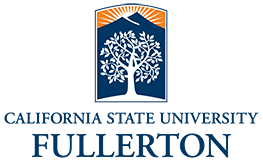
Online Bachelor of Arts in Sociology
California State University Fullerton’s Bachelor of Arts in Sociology is designed to have a broad-based general sociology curriculum, providing students with a solid educational background as well as preparing them for a rewarding career in numerous fields. Also, it offers a strong focus on understanding interpersonal concepts and relationships, both big and small – the understanding that can be convertible to increased excellence in any career opportunity.
This 51-credit online sociology degree program focuses on the upper-level set of coursework such as:
- social inequality,
- theories of social behavior,
- social research methods,
- gender and sex,
- and statistics, to name a few.
Students can earn their sociology degree in three years, depending on their learning pace. Interested applicants must have 69-70 transferable credits and a GPA of 2.5 to be enrolled in Cal State-Fullerton’s online sociology degree program.
California State University-Fullerton is accredited by the WASC Senior College and University Commission.
American Public University

Online Bachelor of Arts in Sociology
Located in Charles Town, West Virginia, the American Public University offers a Bachelor of Arts in Sociology that develops students’ sociological imagination, opening discoveries and new perspectives into familiar and unfamiliar worlds. Students will strengthen a variety of skills, such as theoretical analysis, research, information literacy, and critical thinking skills.
This 120-credit hour online sociology degree program requires four years to be completed depending on the students’ timeframe of learning. Core courses include:
- social deviance,
- stratification and inequality,
- statistics for social science,
- contemporary sociological theory,
- and classical sociological theory, to name a few.
Moreover, students are required to choose a specific concentration for the program, ranging from Social Justice, Community Action, Public Policy, Health, or Education. Students who earn a sociology degree with APU are well prepared for careers in family support services, politics, law, civil service, or health care.
American Public University has earned accreditation from the Higher Learning Commission.
Florida International University

Online Bachelor of Arts in Sociology & Anthropology
Headquartered in Miami, Florida, Florida International University has a Bachelor of Arts in Sociology and Anthropology with a Sociology track. Students learn from world-class professors, study a wide range of contemporary social issues, and enhance their research and analytical skills.
They are equipped with valuable career skills in a variety of aspects and insight into social theories including:
- social data analysis,
- social survey techniques,
- computer-based integration of social phenomena,
- and social statistical sampling methods.
This 120-credit hour sociology program has core courses such as Social Theory, Societies in the World, Sociological Theories, Research Methods, and Introduction to Quantitative Social Research, among other featured courses.
Florida International University is accredited by the Southern Association of Colleges and Schools Commission on Colleges.
Tennessee State University

Online Bachelor of Science in Sociology
Tennessee State University offers a Bachelor of Science in Sociology that combines scientific and humanistic approaches to examine, describe, explain, and comprehend the connections between the social concepts that help shape peoples’ identities, beliefs, behavior, and ways to live their lives.
Students develop a solid understanding of social institutions and social interactions, as well as strong analytical skills that are highly recognized by different industries and community organizations. Core sociology courses include:
- Contemporary Sociological Theory,
- Social Statistics,
- Introduction to Social Research,
- Classical Sociological Theory,
- and Senior Project, among other featured courses.
- A total of 120 credit semester hours is required to earn this program.
Tennessee State University garnered accreditation from the Southern Association of Colleges and Schools Commission on Colleges.
Arizona State University

Online Bachelor of Science in Sociology
The Bachelor of Science in Sociology offered by Arizona State University focuses on social change, social life as well as the social impact and causes of human behavior. This sociology program offers a broad set of courses on traditional social institutions and contemporaneous social issues. ASU’s Sociology program covers topics such as:
- globalization of work,
- courtship and marriage,
- gender and health,
- technology and its impact on society,
- and politics.
Students have the opportunity to develop proficiencies in research methods, statistics, and written communication skills. In addition to the courses required in this program, Sociology students should take two Science and Society courses under the College of Liberal Arts and Sciences policy. Core Sociology courses include:
- Modern Social Problems,
- Social Statistics,
- History of Social Thought,
- and Racial and Ethnic Relations, among other highlighted courses.
Arizona State University obtained accreditation from the Higher Learning Commission.
Columbia College

Online Bachelor of Arts in Sociology
Columbia College has a Bachelor of Arts in Sociology that enhances students’ valuable skills in program evaluation, data analysis, organizational management, and social trend analysis, which are highly preferable in any government agencies, business sectors, and non-profit organizations. It includes the study of social issues and challenges, including racism, poverty, homophobia, crime, and sexism.
This sociology program integrates technological innovations, policies, new ideas, and cultural phenomena in addressing these issues. This 120-credit hour program has core sociology courses such as:
- Minority Cultures and Relations,
- Contemporary Social Theory,
- General Sociology,
- Quantitative and Qualitative Research Methods,
- and Classical Social Theory, to name a few.
A foreign language requirement is mandatory in the completion of this program.
Columbia College is accredited by the Higher Learning Commission.
UMass Global

Online Bachelor of Arts in Sociology
Established in Irvine, California, UMass Global offers a Bachelor of Arts in Sociology and equips students with the methodologies and theories essential to examine societies or communities. Furthermore, students apply major sociological theories to study populations as well and they can evaluate the structure of major social institutions and organizations.
UMass Global’s sociology program is composed of 45 core credits and 18 minor credits. Core sociology courses include:
- Intercultural Communication,
- Globalization and Social Change,
- Social Theory,
- Sociology of Organizations and Institutions,
- and Social Inequality/Stratification, among others.
The program requires a social science capstone project for completion. The university integrates the Blackboard platform in the coursework delivery as well and it offers multiple start dates annually.
UMass Global has earned accreditation from the WASC Senior College and University Commission.
University of Texas Permian Basin

Online Bachelor of Arts in Sociology
University of Texas Permian Basin has a Bachelor of Arts in Sociology that concentrates on the scientific study of human behavior within communities. Sociology students explore human interactions within groups and organizational settings, factors that influence social behavior in a variety of social groups, and the diversity of societies and cultures around the world.
Students are required to complete 120 credit hours, with 42 hours of general course requirements, 34 hours of sociology core courses, 18 hours of minor subjects, and 26 hours worth of electives. Core sociology courses include:
- Introductory Statistics,
- Sociological Theory,
- Introduction to Sociology,
- Social Research Methods,
- and Senior Research Seminar.
University of Texas Permian Basin has acquired accreditation from the Southern Association of Colleges and Schools Commission on Colleges.
Oregon State University
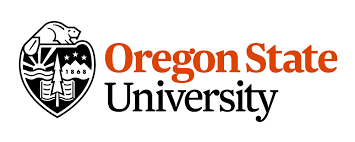
Online Bachelor of Arts in Sociology / Online Bachelor of Science in Sociology
The B.A. or B.S. in Sociology offered by Oregon State University allows students to study how gender and ethnic differences are essential to the formation of human values and society. They also discuss modernization and globalization.
Prospective students develop a strong foundation of knowledge in written and non-written communication, research methods, quantitative analysis, and social policies. They can also opt for environmental and natural resource concentration, giving students the capability to apply social science concepts.
OSU’s sociology program requires 180 credits for completion, including 45 credits of core sociology courses with a 3-unit Writing Intensive Course, 15-credit College of Liberal Arts core, and 48-credit Sociology major, among other core areas. Core course topics include:
- sociological theory,
- crime and justice,
- rural sociology,
- criminology and penology,
- consensus and natural resources,
- population trends and policy,
- and sociology of education.
Oregon State University obtained its accreditation from the Northwest Commission on Colleges and Universities.
Washington State University

Online Bachelor of Arts in Sociology
Washington State University has a Bachelor of Arts in Sociology that develops students’ skills in a variety of sociology-related requirements, such as quantitative and symbolic reasoning, communication, critical thinking, research methods, and life-long learning skills. This sociology program provides a deep understanding of the foundations of society, including social order conflicts, diversity & inequality.
Students develop different essential skills that will be used in pursuing professional pathways and graduate studies. Core sociology courses include:
- Introduction to Sociology,
- Research Methods in Sociology,
- Quantitative Techniques in Sociology
- and Developmental Social Theory, among others.
The Northwest Commission University on Colleges and Universities has accredited Washington State.
Saint Leo University

Online Bachelor of Arts in Sociology
Saint Leo University offers a Bachelor of Arts in Sociology that is provided in one of the most flexible formats, allowing distance learners to balance their personal and professional lives while earning their degree. It explores different social issues and problems in race, ethnicity, globalization, medical & environmental fields, and urbanization. Students need 120 credit hours for the completion of the sociology degree. They are strongly encouraged to enroll in Spanish language courses.
Saint Leo offers two specializations under the online sociology degree, namely Diversity and Inequality Specialization and Applied and Clinical Specialization. Core Sociology requirements include:
- Quantitative Methods,
- Introduction to Sociology,
- Comprehensive Sociology Examination,
- Sociological Theories,
- Qualitative Methods,
- and Senior Seminar in Sociology.
Saint Leo University is accredited by the Southern Association of Colleges and Schools Commission on Colleges.
National University

Online Bachelor of Arts in Sociology
The Bachelor of Arts in Sociology offered by the National University engages students to explore social change, social life, and the consequences and causes of human behavior. They learn and understand the structure of societies, communities, and organizations. This 180-credit hour sociology program has core course requirements such as:
- Classical Social Theory,
- Sociology of Deviance,
- Power and Social Change,
- Methods of Social Inquiry,
- and Organizational Psychology, to name a few.
Graduates of this program are well-prepared for a variety of career opportunities in social work, law enforcement, medicine, education, and any related field involving investigative capabilities and diverse societies.
National University has received accreditation from the WASC Senior College and University Commission.
McKendree University
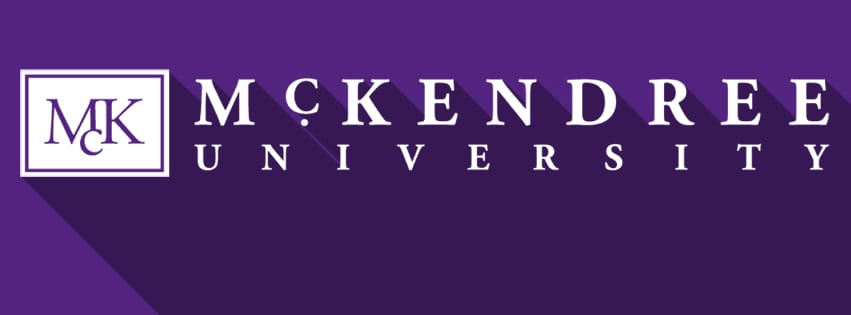
Online Bachelor of Arts in Sociology-Criminal Justice
Lebanon, Illinois is home to McKendree University which has a Bachelor of Arts in Sociology-Criminal Justice that prepares graduates for several career opportunities in court services, law enforcement, and corrections. This sociology degree program helps students change the way they view and perceive the world and societies around them.
The criminal justice concentration is suitable for students who want to pursue careers that utilize skills and knowledge to think critically about the diverse social issues impacting today’s society.
The university requires a minimum of 120 credit hours for the completion of the sociology degree, with 40 of those must be at the 300-400 level and 30 hours with McKendree. Core courses include:
- Race and Ethnic Relations,
- Juvenile Delinquency,
- Social Class and Inequality,
- Police and Urban Society,
- and Correctional Institutions.
All classes are delivered over an eight-week format, with the option to take two courses during each eight-week session.
McKendree University has received accreditation from the Higher Learning Commission.
South Dakota State University

Online Bachelor of Science in Sociology
South Dakota State University offers a Bachelor of Science/Art in Sociology that provides an overview of essential sociology topics such as family dynamics, contemporary sociological issues, deviance and crime, and gender & ethnicity among many others. Sociology majors engage in research and studies related to:
- management,
- criminal justice data analytics,
- public sector,
- human and social services,
- non-profit organizations,
- and marketing and sales.
The set of coursework equips students to enhance and develop evidence-based arguments, be flexible in changing situations, and provide presentations that non-sociologists can comprehend, enabling them to be well-prepared in pursuing career opportunities.
The Higher Learning Commission has accredited South Dakota State University.
Western Kentucky University

Online Bachelor of Arts in Sociology
Western Kentucky University has a Bachelor of Arts in Sociology that emphasizes social behavior and sociability in the aspects of human behavior and nature. WKU’s sociology degree requires a minimum of 120 credit hours, with 31 semester hours comprising of a minimum of ten courses plus another six required courses in sociology.
Students develop their abilities to communicate effectively and promote teamwork, to speak effectively in different group settings, and to plan and execute projects and programs in a variety of social settings. They have the opportunity to choose from four concentrations, namely:
- Research Methods
- Community, Environment, and Development
- Inequality and Social Change
- Family, Gender, and Sexuality
However, they can choose the General Sociology major program without a specific concentration. Core sociology courses include Strategies of Social Research, Introductory Sociology, Senior Seminar, Statistics in Sociology, and Sociological Theory: Perspectives on Society.
Western Kentucky University has received accreditation from the Southern Association of Colleges and Schools Commission on Colleges.
Fort Hays State University

Online Bachelor of Arts in Sociology / Online Bachelor of Science in Sociology
Fort Hays State University has a Bachelor of Science in Sociology and Bachelor of Arts in Sociology program that helps develop students’ critical thinking and problem-solving skills while preparing them for a rewarding profession where they can make a fulfilling impact toward improving the society around them. The university provides support services for its students, including research support and internship opportunities.
FHSU values every student’s academic experience, and they offer support services to help them gain an in-depth understanding and appreciation of community, culture, and society as well as the relationship between human behavior and social structures. Sociology major core courses include:
- Introductory Sociology,
- Social Inequality,
- Methods of Social Research,
- Cultural Anthropology,
- Grant Writing,
- Advanced Sociological Research,
- and Sociological Theory and Literature.
Fort Hays State University has been accredited by the Higher Learning Commission.
Southern New Hampshire University

Online Bachelor of Arts in Sociology
Southern New Hampshire University’s Bachelor of Arts in Sociology helps students explore society’s economic, historical, and political issues as well as discover experiential observations, assignments, and case studies to address real-world problems. SNHU’s sociology degree provides students with the essential skills to advocate for change by understanding the interconnectedness of global cultures.
The university also offers a concentration in Community Health under the Sociology degree. It covers major theoretical concepts and focuses on the use of sociological methods to solve social inequalities.
The set of coursework includes a series of assignments that create abstract concepts and theories applicable to real-world scenarios, including a capstone project and fieldwork. Core courses include:
- Social Science Research Methods,
- Sociological Perspectives,
- World Geography,
- Introduction to Sociology,
- and Sociology of Social Problems.
Sociology students must earn at least 120 credit hours.
Southern New Hampshire University is accredited by the New England Commission on Higher Education.
University of Northern Colorado
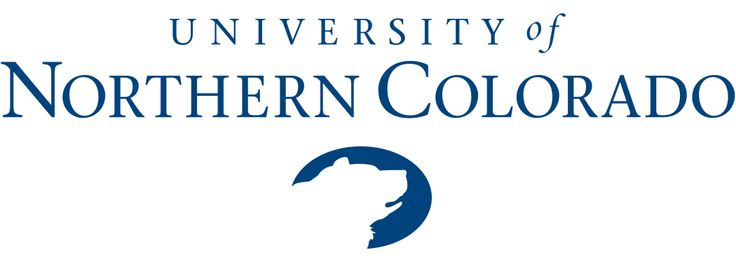
Online Bachelor of Arts in Sociology
The University of Northern Colorado has a Bachelor of Arts in Sociology that is considered one of the most flexible liberal arts degrees in the country. It is specially designed for working adults who need the flexibility of earning a degree without compromising their personal and professional obligations.
Students will develop marketable skills that are valuable for a wide range of professional pathways. They promote effective communication, writing, research, and critical thinking skills. Also, they enhance their skills in the application of social context to address cultural issues at a group, organizational, and societal level.
This 120-credit hour sociology degree can be completed in as little as 24 months, depending on the student’s learning pace. Required sociology courses include:
- Methods of Sociological Research I and II,
- Classical Social Theory,
- Introduction to Sociological Practice,
- and Methods of Sociological Research Lab I and II.
Students are required to choose one concentration from the program, namely:
- Deviance and Social Control
- Family
- Inequalities & Institutions
- Social Psychology and Life Course
The University of Northern Colorado has received accreditation from the Higher Learning Commission.
McNeese State University

Online Bachelor of Sociology
Based in Lake Charles, Louisiana, McNeese State University offers a Bachelor of Sociology that allows distance learners to take two 7-week sessions within a regular semester and three-week classes, including 6-week sessions during the summer season.
McNeese’s sociology degree provides a concrete liberal arts background for students to prepare them for further graduate studies or in different industries. Core sociology course topics include:
- statistics,
- research methods,
- gender and ethnicity,
- technology,
- and social psychology, to name a few.
In addition, students develop their written and non-written communication skills, analytical and critical thinking skills as well as research concepts. Admission to the McNeese sociology program is reserved for non-traditional students ages 25 years and above or students who have challenges balancing their academic life with personal and professional obligations.
McNeese State University has earned accreditation from the Commission on Colleges of the Southern Association of Colleges and Schools.
Maryville University of St. Louis

Online Bachelor of Arts in Sociology
Headquartered in St. Louis, Missouri, Maryville University has a Bachelor of Arts in Sociology that has direct career emphasis and focuses on the in-demand sociology-related skills, setting Maryville University apart from the others. Students are encouraged to choose a set of coursework that is aligned with their passions and interests as well as their professional aspirations.
The sociology curriculum designed by Maryville covers a diverse range of topics, including:
- juvenile delinquency,
- ethnicity,
- community responsibility,
- mental illness,
- crime
- and human sexuality.
Furthermore, students get involved in research assignments and projects that are tailored to their interests. Core sociology courses include:
- Domestic and International Terrorism,
- Sociology of Health and Health Care,
- Introduction to Social Work,
- Race, Ethnicity, and Crime,
- Social Aspects of the Aged,
- and Social Class in Society among the many featured courses.
Maryville University has acquired accreditation from the Higher Learning Commission.
University of Central Florida
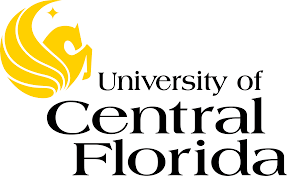
Online Bachelor of Arts in Sociology / Online Bachelor of Science in Sociology
The University of Central Florida offers a Bachelor of Science/Bachelor of Arts in Sociology, helping students gain analytical, critical thinking, and research skills essential to interpreting human behavior.
This 120-credit hour sociology program has a set of coursework that emphasizes on:
- diversity and social inequality,
- law and deviance,
- crime and social psychology, among others.
Students will broaden their appreciation of human behavior and experience while developing innovative solutions to real-world problems. A capstone project is required for the completion of the program. Graduates are prepared with a variety of career opportunities, such as:
- human resources,
- marketing research,
- diversity training,
- healthcare,
- victim advocacy,
- law,
- event planning, and many other sociology-related industries.
The University of Central Florida is accredited by the Southern Association of Colleges and Schools Commission on Colleges.
Kennesaw State University

Online Bachelor of Science in Sociology
The Bachelor of Science in Sociology offered by Kennesaw State University prepares students to comprehend and deal with modernization, social change, and diversity ranging from local to international scales.
Students enhance their skills in a variety of concepts and areas, including communication skills, critical thinking, analytical and data gathering skills, community awareness and interaction, and technological facilities as well as gain an understanding of the structure and functions of groups and communities, self-awareness, and interpersonal skills.
Kennesaw’s Sociology program has four major concentrations integrated into one, namely:
- General Sociology,
- Cultural and Social Change,
- Medical Sociology,
- and Criminology.
Graduates are prepared to work as social research assistants, criminologists, urban planners, employee specialists, public survey workers, demographers, and many other occupations.
Kennesaw State University is accredited by the Southern Association of Colleges and Schools Commission on Colleges.
Frequently Asked Questions

What are the advantages of majoring in Sociology?
- Develops analytical and critical thinking skills: Sociology courses require students to think critically and analyze information to understand how societies, cultures, and behaviors function.
- Enhances communication and interpersonal skills: Students learn to effectively communicate their ideas and to understand the perspectives of others.
- Explores current social issues: Sociology courses often touch on current social issues, such as racism and poverty, which can give students valuable insight into the world around them.
- Gain an understanding of diversity: Through studying sociology, students gain a better understanding of how different cultures, beliefs, and values interact with one another.
- Improves job prospects: A major in sociology can lead to a variety of career opportunities, such as social work, counseling, human resources, and more.
What typically makes up the online Sociology curriculum?
The world of sociology revolves around social indicators to examine different organizations, societies, and institutions that consist of our modern community, as well as bring positive impact for millions of people around the nation.
Sociology is previewed through numerous online sociology courses, integrating research work, community outreach programs, and creative thinking capabilities to comprehend better social interactions, social factors that influence human behavior, and social influences across different societies.
Sociologists are primarily interested in the different ways in which human interaction and behavior influence individual societies and the community as a whole. Race, gender, religion, educational background, age, and income range are some of the few factors sociologists utilize to evaluate the strengths and areas for improvement within the judicial systems, academic institutions, government sectors, religious communities, and other cultural settings.
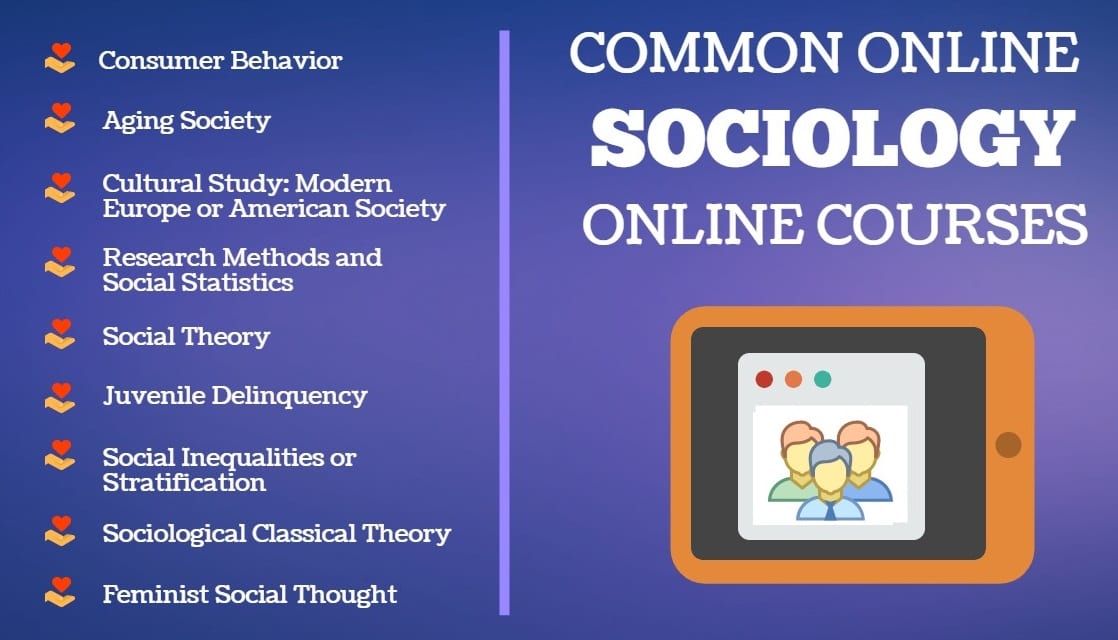
Sociology courses required to earn a degree in this specific field are different from one distance learning institution to another. Generally, students will need to have at least 120 credits to earn a bachelor’s degree in sociology. You will need to acquire approximately 30 credit hours in the sociology major aside from the credit requirements suggested by your chosen college or university.
Sociology students need to take Introduction to Sociology courses as they serve as a prerequisite to almost all other sociology courses. Sociology 101 will provide you with a detailed overview of what sociology is all about, including the methodologies, history, theories, and concepts that you will study along the way.
The student must complete standard courses such as Research Methods and Social Statistics before they advance to other areas of sociology. Research Methods provide a hands-on learning experience in conducting quantitative and qualitative methods in the research field. On the other hand, you will need to enroll in the Social Statistics course, as it will help you organize the data you have collected and analyzed.
You will need to formulate a hypothesis for your sociological research. In statistical coursework, you will learn and conduct sample descriptions, theories, and sample populations. The data you have collected will be inputted into a computer’s analytical software application in which graphs, charts, and relationships can be used to formulate analysis and as part of the research.

Social Theory, Juvenile Delinquency, Social Inequalities or Stratification, Sociological Classical Theory, or Feminist Social Thought are some of the courses that you will be studying under the systematic analysis of theoretical perspectives. Every school has a different set of coursework, targeting specific social settings and social views.
Upper-level course requirements allow you to delve into a more specific range of classes. Depending on your passion and goals, you may choose a particular concentration offered by your chosen school. You may be required to take a sociology-related course such as Consumer Behavior, Aging Society, or a specific culture such as Modern Europe or American Society.
Earning a degree in Sociology provides you with a solid foundational background and skills necessary for a variety of career opportunities. Graduates are well-prepared for careers in the business sectors, education, government sectors, research fields, and other numerous industries.
What are the duties of a Sociology professional?
The majority of sociologists focus their roles and responsibilities on either using their research as stepping stones for social policies and advocacy, providing expertise and advice to educators, legislators, and politicians in resolving contemporary societal challenges and problems; or redefining the theories, concepts, and methodologies of sociological processes.
The former usually find work in community centers and government sectors, while the latter find work in academic and educational institutions where research is a must.
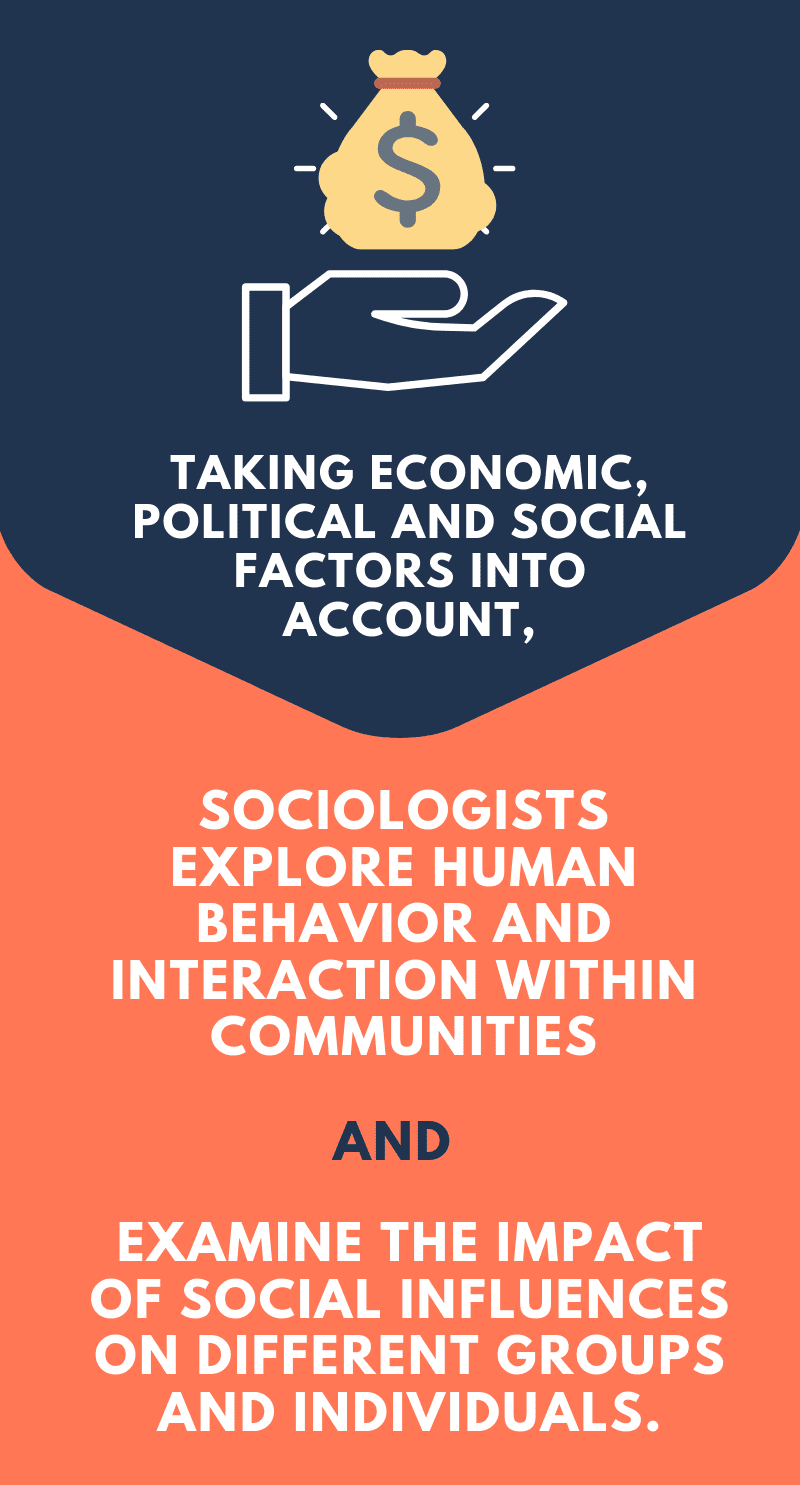
Formerly, sociologists focused their field of study on subjects that covered social classes, religion, laws, social stratification, and secularization. With the advancement of human societies, the area of Sociology has evolved.
As such, it now emphasizes modern topics and concepts such as Criminology, Healthcare, Education, Human Resources, Marketing, and even the Military. Also, the internet is now part of the study as a social phenomenon in modern societies.
Sociologists and Anthropologists have many similar traits and are often confused by people who are unfamiliar with the differences between both professions.
While both of them focus on human societies and their interaction, Sociologists put more work into the study of communities, understanding the history and origins of human beings. They study social behavior and communities through the examination of groups, organizations, cultures, processes, and social institutions.
Sociologists explore and understand human behavior, interaction, and communities within the context of a larger setting in terms of economic, political, and social factors. They observe and examine the activity of economic, political, religious, and social groups, institutions, or communities carefully. They study the impact of social influences on different groups and individuals as well as trace the history and origins of these groups.
Sociologists perform the following roles and responsibilities:
- Analyze and come up with conclusions from the data collected and gathered
- Work with other sociologists and social scientists in carrying out new and innovative research and solutions
- Gather data through interviews, surveys, sampling, observations, and other means of data collection
- Conduct research works to test theories and methodologies regarding social issues
- Develop or prepare articles, presentations, and reports highlighting their research findings
- Ask or provide counsel to clients, legislators, policymakers, and other groups on research discoveries and sociological factors.
Many bachelor’s and master’s degree holders will establish careers in related fields such as education, public policy, healthcare, social services, law enforcement, and other specific areas. Graduates with an advanced degree solid research skills and a statistical background will have better career opportunities and lucrative earnings.
Sociologists work to improve communities and societies by studying and understanding their challenges and issues and eventually developing solutions. Working for the common good requires a great sense of passion and purpose. As a result, employers tend to hire applicants with extensive training and experience in volunteering programs, helping communities, and being immersed in the realities of life.
The standard requirement for prospective candidates must have two years of professional experience working in the field through internship programs or as volunteers. However, some employers prefer candidates with a doctor’s degree in sociology.
What careers do Bachelor’s in Sociology graduates pursue?
Sociology provides a concrete foundation in both understanding human behavior and systems, so the skills that students enhance can be utilized in numerous career opportunities across several industries. You can establish a career in social work but can also work in public relations, marketing, or human resources. Some professions require a graduate equivalent of the degree; however, someone who initially earns an undergraduate degree can apply for entry-level positions and build their career.
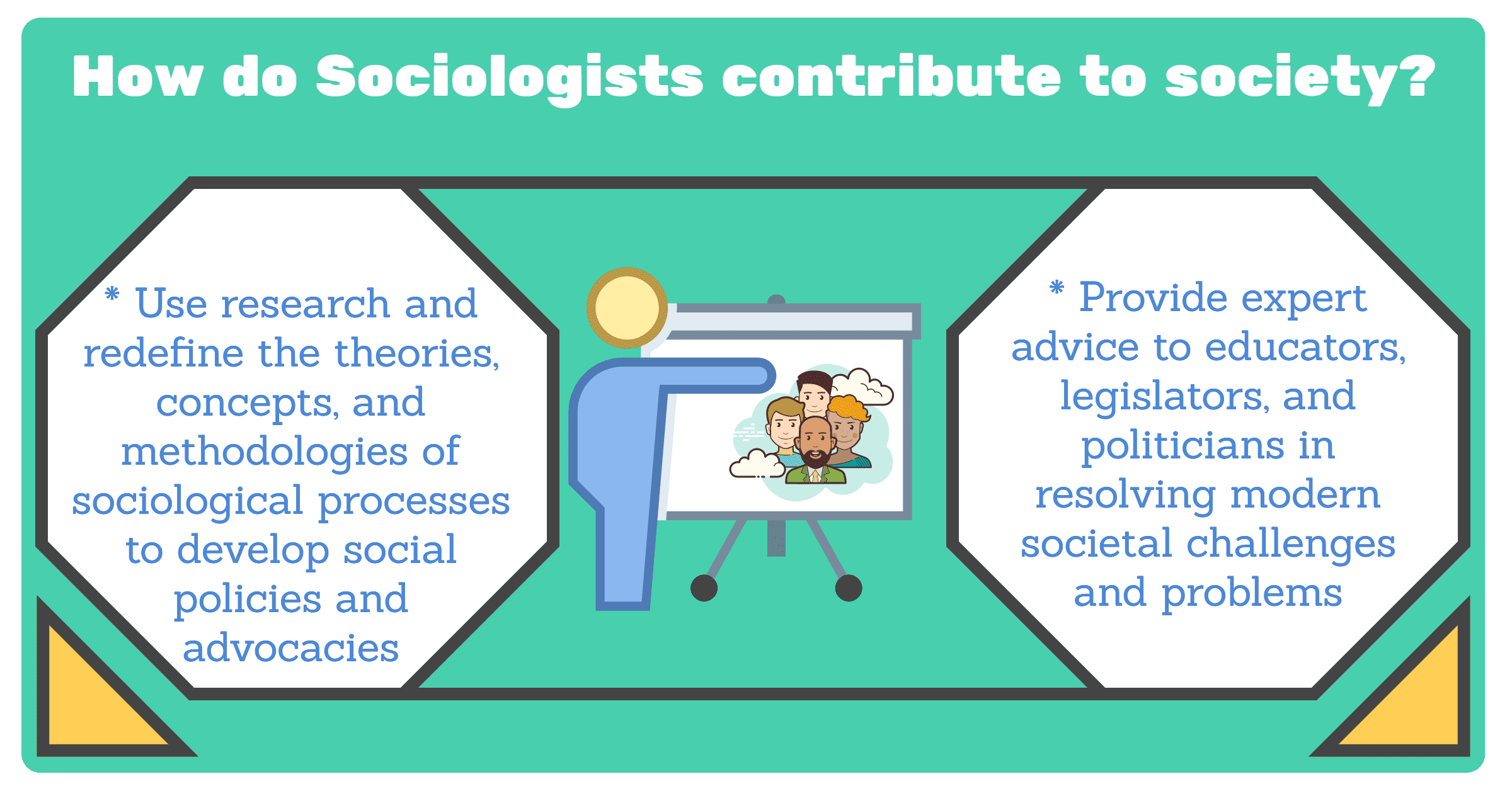
A degree in sociology opens a wide array of job opportunities in counseling, administrative services, education, public sectors, healthcare, rehabilitation facilities, research, and government sectors. The career you choose will depend on how you want to help others and how you believe you can best apply your expertise and passion. The most common sociology-related occupations can be working as:
- Behavioral Disorder Counselor
- Correctional Treatment Specialist
- Health Educator
- Marriage/Family Therapist
- Mental Health Counselor
- Probation Officer
- Rehabilitation Counselor
- Recreational Therapist
- Social or Community Service Manager
- Social or Human Services Assistant
- Social Worker
- Substance Abuse Counselor
In other cases, volunteering can also be a gateway to gaining relevant experiences. You must look for volunteering or work experiences that you are passionate about so that you will develop essential skills aligned with your career goals and aspirations.
There are internship programs or opportunities for more structured work experience if you are considering a career in Civil Service or the law. Take note, that competition in this industry is tight; therefore, extensive research into the company you are planning to apply to is essential.
While some sociology graduates work in social welfare, there are opportunities with a wide range of employers throughout the public and private sectors. A variety of sociology degree holders are employed in the following industries:
- Academic Institutions
- Federal, Local, and State Government
- Law
- Law Enforcement and Criminology
- Marketing and PR
- Media Companies
- Non-profit organizations
- Social and Market Research Organizations
The top three typical organizations for sociologists include the following:
Social Services
The majority of sociology graduates pursue full-time positions in social services, while half of the population work as interns. These professions include case managers, family advocates, social workers, and other related fields. Social services work commonly in public sectors, and graduates may find work opportunities in Child Protective Services and other government sectors.
Nonprofit Organizations

Non-profit Organizations conduct fundraising and provide services to specific sectors of the communities, such as low-income families and victims of child abuse, to name a few.
Graduates utilize their background in social theories and social behavior to provide counsel in helping a non-profit’s target demographic. According to the American Sociological Association, sociology majors go into clerical work, while some work as bookkeepers, receptionists, or admins or assistants in charities.
Research and Analysis
A sociology degree offers graduates keen attention to social behavior. As a result, this ability can assist government sectors, private organizations, healthcare professionals, and research facilities to develop and implement regulations, procedures, and policies. Market research, policy analysis, and other related fields are suitable for graduates with a bachelor’s degree in Sociology.
Is earning a Bachelor’s in Sociology worth my time and money?
It depends on your goals. If you are looking to pursue a career in sociology or a related field, then a Bachelor’s degree in sociology may be worthwhile for you. Earning a Bachelor’s degree can give you a sound understanding of the concepts and skills you need to be successful in the field. It can also help you stand out in the job market and open up new opportunities.
On the other hand, if you have no plans to work in sociology and simply want to learn more about it, you might want to explore other options, such as taking independent classes, getting mentorship, or participating in online courses.
Take time to watch this YouTube video about the field of Sociology:
